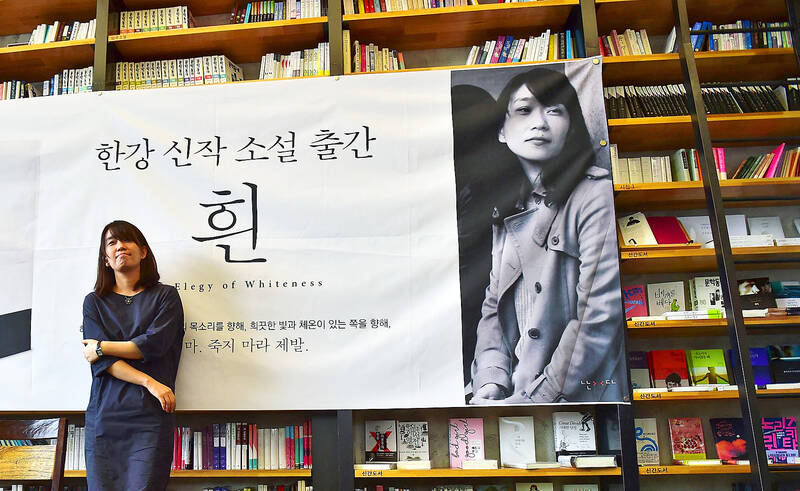South Korean author Han Kang won this year’s Nobel Prize in Literature for “her intense poetic prose that confronts historical traumas and exposes the fragility of human life,” the award-giving body said yesterday.
The prize is awarded by the Swedish Academy and is worth 11 million Swedish kronor (US$1.06 million).
“She has a unique awareness of the connections between body and soul, the living and the dead, and in her poetic and experimental style has become an innovator in contemporary prose,” Anders Olsson, chairman of the academy’s Nobel Committee, said in a statement.

Photo: AFP
Han, the first South Korean to win the literature prize, began her career in 1993 with the publication of a number of poems in the magazine Literature and Society, while her prose debut came in 1995 with the short story collection Love of Yeosu.
Born in 1970, she comes from a literary background, her father being a well-regarded novelist.
Han won the Man Booker International Prize for fiction for her novel The Vegetarian in 2016, the first of her novels to be translated into English and regarded as her major international breakthrough.
In The Vegetarian, after struggling with gruesome recurring nightmares, Yeong-hye, a dutiful wife, rebels against societal norms, forsaking meat and stirring concern among her family that she is mentally ill.
Two of her books have been made into films: The Vegetarian in 2009, directed by Lim Woo-seong, and 2011’s Scars, by the same director.
Her 2002 novel Your Cold Hands, which bears obvious traces of Han’s interest in art, reproduces a manuscript left behind by a missing sculptor who is obsessed with making plaster casts of female bodies.
“There is a preoccupation with the human anatomy and the play between persona and experience, where a conflict arises in the work of the sculptor between what the body reveals and what it conceals,” the academy said in an official biography.
She is the second South Korean to win a Nobel prize ever, after 2000 peace prize winner and former South Korean president Kim Dae-jung.
Bookmaker favorites ahead of the announcement included Chinese writer Can Xue (殘雪) and many other perennial possible candidates such as Kenya’s Ngugi Wa Thiong’o and Australia’s Gerald Murnane.
“I was able to talk to Han Kang over the phone,” Mats Malm, permanent secretary of the Swedish Academy, told a news conference. “She was having an ordinary day, it seems, she had just finished supper with her son.”

AT RISK: The council reiterated that people should seriously consider the necessity of visiting China, after Beijing passed 22 guidelines to punish ‘die-hard’ separatists The Mainland Affairs Council (MAC) has since Jan. 1 last year received 65 petitions regarding Taiwanese who were interrogated or detained in China, MAC Minister Chiu Chui-cheng (邱垂正) said yesterday. Fifty-two either went missing or had their personal freedoms restricted, with some put in criminal detention, while 13 were interrogated and temporarily detained, he said in a radio interview. On June 21 last year, China announced 22 guidelines to punish “die-hard Taiwanese independence separatists,” allowing Chinese courts to try people in absentia. The guidelines are uncivilized and inhumane, allowing Beijing to seize assets and issue the death penalty, with no regard for potential

STILL COMMITTED: The US opposes any forced change to the ‘status quo’ in the Strait, but also does not seek conflict, US Secretary of State Marco Rubio said US President Donald Trump’s administration released US$5.3 billion in previously frozen foreign aid, including US$870 million in security exemptions for programs in Taiwan, a list of exemptions reviewed by Reuters showed. Trump ordered a 90-day pause on foreign aid shortly after taking office on Jan. 20, halting funding for everything from programs that fight starvation and deadly diseases to providing shelters for millions of displaced people across the globe. US Secretary of State Marco Rubio, who has said that all foreign assistance must align with Trump’s “America First” priorities, issued waivers late last month on military aid to Israel and Egypt, the

‘UNITED FRONT’ FRONTS: Barring contact with Huaqiao and Jinan universities is needed to stop China targeting Taiwanese students, the education minister said Taiwan has blacklisted two Chinese universities from conducting academic exchange programs in the nation after reports that the institutes are arms of Beijing’s United Front Work Department, Minister of Education Cheng Ying-yao (鄭英耀) said in an exclusive interview with the Chinese-language Liberty Times (the Taipei Times’ sister paper) published yesterday. China’s Huaqiao University in Xiamen and Quanzhou, as well as Jinan University in Guangzhou, which have 600 and 1,500 Taiwanese on their rolls respectively, are under direct control of the Chinese government’s political warfare branch, Cheng said, citing reports by national security officials. A comprehensive ban on Taiwanese institutions collaborating or

France’s nuclear-powered aircraft carrier and accompanying warships were in the Philippines yesterday after holding combat drills with Philippine forces in the disputed South China Sea in a show of firepower that would likely antagonize China. The Charles de Gaulle on Friday docked at Subic Bay, a former US naval base northwest of Manila, for a break after more than two months of deployment in the Indo-Pacific region. The French carrier engaged with security allies for contingency readiness and to promote regional security, including with Philippine forces, navy ships and fighter jets. They held anti-submarine warfare drills and aerial combat training on Friday in